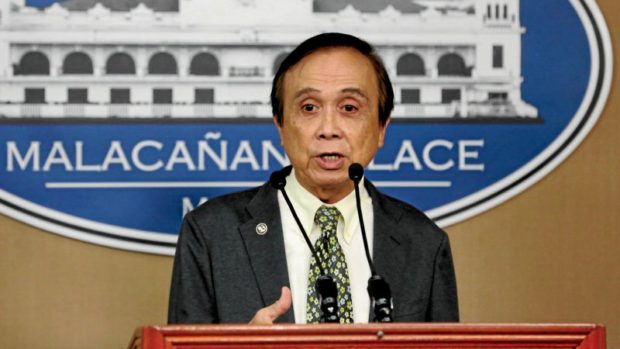Economic managers: Weak peso, stock market ‘not signs of weak economy’

Socioeconomic Planning Secretary Ernesto M. Pernia. INQUIRER file photo / JOAN BONDOC
Economic managers on Monday reiterated that the weak peso and stock market were not signs of a weak economy, as they highlighted the gains in the economy despite a depreciating currency.
Also, Socioeconomic Planning Secretary Ernesto M. Pernia told reporters in a press conference after the Cabinet-level Development Budget Coordination Committee (DBCC) that they “certainly hope” that gross domestic product (GDP) growth in the second quarter reached 7 percent.
The government will announce the second-quarter GDP performance in August.
The first-quarter GDP expansion of 6.8 percent fell below the 7-8 percent full-year target as the high inflation environment tempered growth.
The Philippines nonetheless remained among the fastest-growing emerging economies in the region at the start of the year.
Pernia, who also heads the state planning agency National Economic and Development Authority, said that growth drivers during the April to June period included “frenetic activity” in the infrastructure sector in line with the Duterte administration’s ambitious “Build, Build, Build” program.
“There’s so much spending on capital equipment,” Pernia said, adding that there was no longer underspending so far this year.
As of May, government spending on public goods and services jumped 25 percent year-on-year to P1.325 trillion, also 1-percent higher than the five-month expenditure program, the latest government data showed.
From January to May, the government spent P280.8 billion on infrastructure and other capital outlays, up 42.4 percent from a year ago.
As such, the DBCC maintained the yearly 7-8 percent GDP growth target from 2018 to 2022, while keeping the foreign exchange rate assumption to 50-53:$1 for the same five-year period.
In April, the DBCC raised the forex rate assumption from 49-52:$1 previously, on expectations of a weaker peso in the medium term mainly due to looming further US interest rate hikes.
While the peso slid to nearly 12-year lows in recent weeks, Finance Secretary Carlos G. Dominguez III said that a depreciating currency “doesn’t mean to say that the economy is weak.”
“It’s just a phenomenon. When the economy is growing, you have a trade deficit—the reason it has increased is because over the last two years, capital goods imports increased,” Dominguez, who heads the Duterte administration’s economic team, said.
The widening trade deficit, a result of more imports coming in than the country’s exports, brought about a current account deficit, which was worrying the market and weakened the peso.
“Our businessmen who have foreign debt are seeing [the] cost of interest rates going up so they are prepaying their debt. Is that a sign of a weak economy? I doubt it. We are, unfortunately, being buffeted by policy abroad, basically shrinking the balance sheets of their central banks, raising interest rates,” Dominguez said.
As for the bearish stock market, Dominguez said: Here’s another myth—if the stock market is doing well, the economy is doing well. I’m not an expert in the stock market. It dropped below 8,000, but the economy is still growing at a tremendous rate. I don’t see a very big drop in the economy. I’m not sure what the relationship is.”
For Dominguez, “we are steaming ahead quite well, if you ask me.”
For his part, Budget Secretary Benjamin E. Diokno noted that the fastest-growing Asian economies have recently seen their currencies decline against the greenback.
Diokno said that compared to end-2017 levels, the Indian rupee depreciated by 6.8 percent, while the Philippine peso weakened by 6.4 percent.
“Let’s not get bogged down. Look at the real numbers, the GDP,” Diokno said.
As for the drop in the stock market, the Budget chief pointed out that these were only “hot money” that can be pulled out by investors anytime, while foreign direct investment for long-term, brick-and-mortar projects hit a record high of $10 billion last year.














